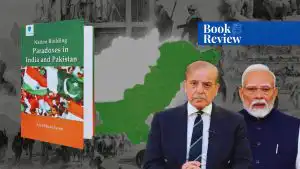Introduction
Jacques Yves Cousteau claims that “the sea, once it casts its spell, holds one in its net of wonder forever.” According to Jacques Yves Cousteau, the ocean demonstrates its power to humanity, especially in today’s era of globalization, where it poses a major challenge to commercial operations, international security, and geopolitical initiatives.
The Indian Ocean serves as a lifeline of international trade because it supports substantial portions of worldwide commerce alongside energy supplies. The strategic significance of this maritime region extends dramatically because global power systems are developing into a multi-polar world structure. The research investigates how India’s maritime forces are changing as well as how these developments impact Pakistan together with the larger Indo-Pacific strategic domain.
India’s Increasing Maritime Power
With the arrival of a multidimensional global order with many dominant players, the regional military alliances are likely to change while the strategic discussions in the region will transform for sure. Within the Indian Ocean, asserting influence and ensuring security are not just matters of national interest but a strategic imperative to be pursued. The Indian maritime domain in history could achieve its unique strength through the establishment of its very solid and strong international trade relations with various regions across Asia and Africa, as well as other continents. India now has to face a lot of challenges in national security strategies because it realizes the importance of naval power development.
The current Indian national security strategy demonstrates specific institutional modifications that center on developing maritime power capabilities in contemporary times. Indian maritime dominance strategies enable the country to advance into a regional power status and international top-ranking force by expanding its seapower capabilities. The Indian maritime strategy depends on security and inclusive regional growth to establish mutual advancement and interregional collaboration.
The Indian naval forces develop monitoring capacity along with surveillance methods for maritime domain control according to their security needs. The exclusive economic zone, together with other maritime interests, drives the need to establish control for achieving defense objectives in India. India uses its financial resources to advance military power projects together with humanitarian aid and disaster response measures to construct regional security networks and expand its influence in the area.
The strategic growth of India takes place through its participation in the Quadrilateral Security Dialogue along with the United States, Japan, and Australia to defend its plans and transform regional security relationships. The Indian policy places cooperation at the forefront by adopting regional naval alliances and organizations that support mutual interests. Through the Malabar naval drills, along with alliance formation, India has reached its highest level of modern maritime advancement.
Furthermore, India depends heavily on imported energy as well as crude oil imports, which makes sea power vital for national security. Protecting crucial sea lanes represents the number one priority since economic breakdowns from ship-based threats, including piracy, and geopolitical turmoil and blockades would devastate India. India is enhancing both its conventional and nuclear naval forces, which brings important changes to regional security conditions.
Challenges for Pakistan
The ongoing US-China contestation and growing strategic importance of the Indo-Pacific region have led to a rethinking of regional security calculations. India’s increasing naval development has also been altering the power dynamics of the Indian Ocean Region in its favor, resulting in military tensions with other states, especially with Pakistan. Also, it could pose a challenge to Pakistan’s strategic interests in Gwadar Port and the China-Pakistan Economic Corridor.
India’s growing maritime ambitions have significant implications for Pakistan, which has long harbored concerns about India’s military modernization and expansion. As such, a realist perspective suggests that India’s growing naval power will put increased pressure on Pakistan’s navy, which is already facing significant resource constraints. India’s ability to control and protect its maritime interests could potentially threaten Pakistan’s maritime trade, which is crucial to its economy.
Beyond bilateral tensions, India’s maritime power will also impact the Indo-Pacific region in a broader sense. The shift in the regional balance of power could eventually challenge the dominance of other regional powers/navies like China. Furthermore, India’s cooperation with regional navies like the United States, Japan, and Australia provides new opportunities for these nations to advance their strategic interests. However, despite these ambitions, challenges persist. India’s naval modernization efforts are often hampered by budgetary constraints. Falling short of the navy’s growing requirements. Nevertheless, the modernization and expansion of naval capabilities remain critical components of India’s broader strategic framework.
In a world, oceans are increasingly critical to achieving global and regional hegemony. Through the lens of the realist approach, maritime power rivalries can be analyzed thoroughly. India has been enjoying support for the achievement of its blue economy ambitions, and for that, it has signed numerous cooperative agreements. For Pakistan, these kinds of developments have directly threatened Pakistan’s security. In reaction, Pakistan has signed mutual defense and economic pacts with multiple states.
The aim of signing the pacts is to counter India’s growing maritime power. Additionally, the non-traditional threats, such as piracy and environmental challenges, further complicate the security landscape, exacerbating existing tensions. To erase the risks of escalation and unintended consequences, risk reduction actions should be implemented to prevent both the escalation of tensions and unforeseen reactions from dangerous developments. Regional players can work towards maintaining stability and ensuring it through dialogue and cooperation.
If you want to submit your articles, research papers, and book reviews, please check the Submissions page.
The views and opinions expressed in this article/paper are the author’s own and do not necessarily reflect the editorial position of Paradigm Shift.
Saqib Hussain Mugheri is pursuing an MPhil in Pakistan Studies (NIPS) from Quaid-e-Azam University Islamabad. He can be reached at [email protected]






